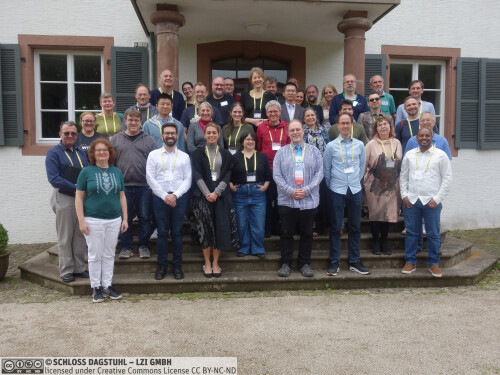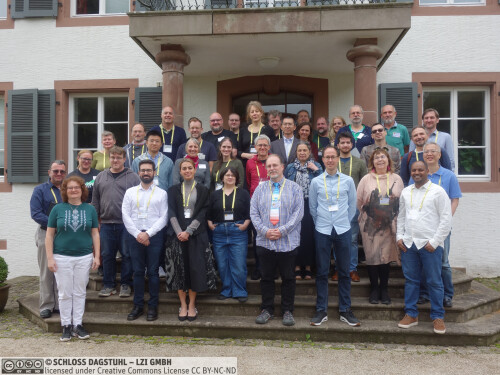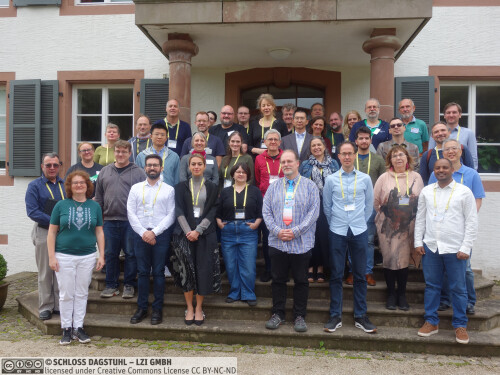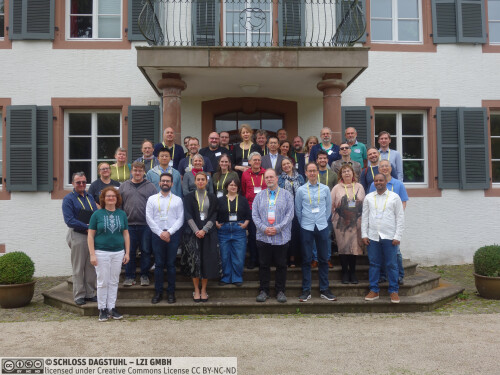Dagstuhl-Seminar 25381
Open Scholarly Information Systems: Status Quo, Challenges, Opportunities
( 14. Sep – 19. Sep, 2025 )
Permalink
Organisatoren
- Hannah Bast (Universität Freiburg, DE)
- Guillaume Cabanac (University of Toulouse, FR)
- Paolo Manghi (CNR - Pisa, IT)
- Jian Wu (Old Dominion University - Norfolk, US)
Koordinator
- Marcel R. Ackermann (Schloss Dagstuhl - Trier, DE)
Kontakt
- Michael Gerke (für wissenschaftliche Fragen)
- Susanne Bach-Bernhard (für administrative Fragen)
Dagstuhl Reports
As part of the mandatory documentation, participants are asked to submit their talk abstracts, working group results, etc. for publication in our series Dagstuhl Reports via the Dagstuhl Reports Submission System.
- Upload (Use personal credentials as created in DOOR to log in)
Gemeinsame Dokumente
- Dagstuhl Materials Page (Use personal credentials as created in DOOR to log in)
Programm
- Upload (Use personal credentials as created in DOOR to log in)
- KMi at Dagstuhl: Open Scholarly Information Systems blog entry at Knowledge Media Institute News, September 25, 20025.
- Dagstuhl Seminar: Open Scholarly Information Systems by Angelo Salatino in his blog on September 20, 2025.
Over the past 30 years, a rich ecosystem of scholarly information systems that openly provide their services to the scientific community has developed. Examples of such systems are aggregators of metadata, such as DBLP, OpenCitations, OpenAIRE Graph, OpenAlex, ORKG, aggregators of full texts such as Semantic Scholar, CiteSeerX, CORE, data repositories, such as arXiv.org, Figshare, Zenodo, Dataverse, and ID authorities, such as ORCID, ROR, Crossref, DataCite.
In this interdisciplinary Dagstuhl Seminar, we want to bring together practitioners from this ecosystem as well as researchers who investigate related research questions or who rely on these systems in their research. This Dagstuhl Seminar is the first of its kind. It will provide a unique opportunity for dialogue, sharing insights, building new networks, and fostering collaboration. In particular, we aim to achieve the following outcomes:
Education about the status quo: Few participants will be familiar with the full ecosystem, which has developed fast in recent years. Just knowing which systems and services exist in the meantime and having heard about them from the creators or key people will be very valuable for all participants.
Bridging the gap between researchers and system providers: We are confident that both researchers on key topics and key people from the various systems will be present at the seminar. We expect that the system’s people will learn about new research relevant to their systems. Vice versa, researchers will learn which problems are relevant in practice, and get inspiration for new practical problems to work on.
Identifying common tasks: We expect that several of the tasks will lead to the identification of common tasks and potentials for synergies between projects. As a minimum, new network connections will form. We also expect that new collaborations or joint initiatives will form, for tackling challenges of common interest.
 Hannah Bast, Guillaume Cabanac, Paolo Manghi, and Jian Wu
Hannah Bast, Guillaume Cabanac, Paolo Manghi, and Jian Wu
Please log in to DOOR to see more details.
- Marcel R. Ackermann (Schloss Dagstuhl - Trier, DE) [dblp]
- Phoebe Ayers (MIT Libraries - Cambridge, US) [dblp]
- Wolf-Tilo Balke (TU Braunschweig, DE) [dblp]
- Hannah Bast (Universität Freiburg, DE) [dblp]
- Guillaume Cabanac (University of Toulouse, FR) [dblp]
- A. Seza Dogruöz (Ghent University, BE) [dblp]
- Martin Fenner (Front Matter - Münster, DE) [dblp]
- Ingo Frommholz (MODUL Universität Wien, AT) [dblp]
- Carole Goble (University of Manchester, GB) [dblp]
- Iryna Gurevych (TU Darmstadt, DE) [dblp]
- Lynda Hardman (CWI - Amsterdam, NL) [dblp]
- Holger Hermanns (Universität des Saarlandes - Saarbrücken, DE) [dblp]
- Min-Yen Kan (National University of Singapore, SG) [dblp]
- Petr Knoth (The Open University - Milton Keynes, GB) [dblp]
- Bianca Kramer (Sesame Open Science - Utrecht, NL) [dblp]
- Christin Kreutz (THM - Gießen, DE) [dblp]
- Cyril Labbé (University of Grenoble, FR) [dblp]
- Michael Ley (Schloss Dagstuhl - Trier, DE) [dblp]
- Paolo Manghi (CNR - Pisa, IT) [dblp]
- Philipp Mayr (GESIS - Köln, DE) [dblp]
- Daniel Mietchen (FIZ Karlsruhe - Berlin, DE) [dblp]
- Carlos Daniel Mondragón Chapa (OpenReview - Cambridge, US)
- Patrick Neises (Schloss Dagstuhl - Trier, DE) [dblp]
- Natasha Noy (Google - Mountain View, US) [dblp]
- Mario Petrella (University of Bologna, IT)
- Lydia Pintscher (Wikimedia - Germany, DE) [dblp]
- Ruzica Piskac (Yale University - New Haven, US) [dblp]
- Rüdiger Reischuk (Universität zu Lübeck, DE) [dblp]
- Angelo Salatino (The Open University - Milton Keynes, GB)
- Ralf Schenkel (Universität Trier, DE) [dblp]
- Ansgar Scherp (Universität Ulm, DE) [dblp]
- Raimund Seidel (Universität des Saarlandes - Saarbrücken, DE) [dblp]
- Tilahun Abedissa Taffa (Leuphana Universität Lüneburg, DE)
- Sahar Vahdati (TIB - Hannover, DE)
- Nees Jan van Eck (Leiden University, NL) [dblp]
- Ruijie Wang (Universität Zürich, CH) [dblp]
- Kathryn Weber-Boer (Digital Science - London, GB)
- Jian Wu (Old Dominion University - Norfolk, US) [dblp]
- Ramin Zabih (Cornell Tech - New York, US) [dblp]
Klassifikation
- Digital Libraries
- Information Retrieval
- Machine Learning
Schlagworte
- scholarly information systems
- scholarly big data
- knowledge graphs
- semantic search
- artificial intelligence





 Creative Commons BY 4.0
Creative Commons BY 4.0
